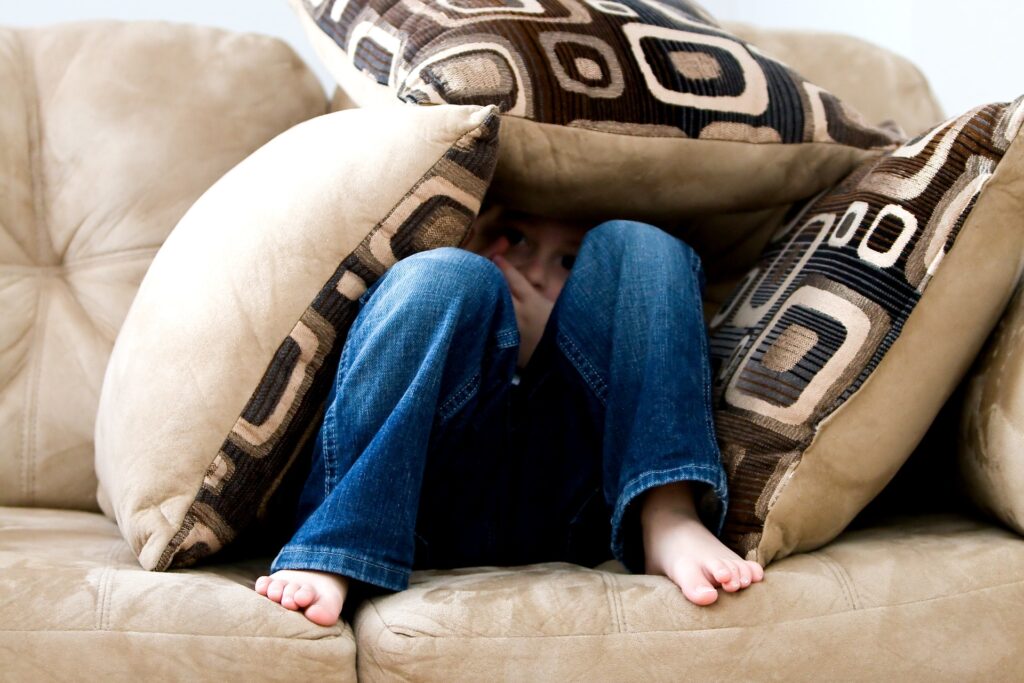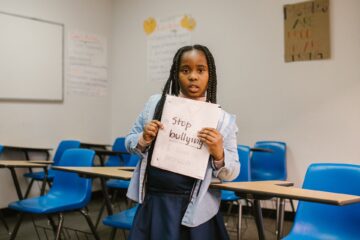On childhood fears: what’s that one thing that terrified you the most as a child?
Every child has that one thing that scares the hell out of them. And some kids have a list of fears. For me, it was rats, chickens, dogs, the dark, and every creepy shape the darkness created!
Oh, there were horror movies as well, and I’m still very much scared to watch horror movies. It’s just too much to take in.
PS: Adults enjoy horror movies because sometimes fear goes with emotions like happiness and excitement. Hence fear can be fun. Why else do we adults crave adrenaline-thrills or scary adventures???! – the brain centers for fears/excitement are triggered.
Childhood fears are often based on the scary experiences of the child or of others. I grew scared of chickens after a hen pecked my knee (my crime was that I held one of her chicks), and I couldn’t imagine getting close to a chicken ever again!
When a child is scared, the threat or fear to that child is real in every sense of the word. Hence, validating their big feelings is far more helpful than dismissing them. Saying things like “there’s nothing to be scared of, it’s just a rat” is unhelpful.
Take a peek…
Why Is Fear Important?
Just as adults get scared, so do children and even babies. Other emotions such as anxiety, anger, or sadness can trigger fear.
Fear is the body’s way of saying, “Hey, this is a threat, and I need you to stay safe, so I’m going to make your heart beat a little faster and do a whole bunch of other stuff just to make you safe.”
However, the problem is that sometimes, the “threat” might not be an actual threat. It can be a situation perceived or believed to be threatening that feels so real even when that isn’t the case.
Babies get scared when they’re startled or when they hear a loud thud. And by the time they are about six months old, some babies start to experience stranger anxiety and separation anxiety. Learn more about baby milestones here.
Emotions are one of the ways our bodies communicate with us. When we are scared, our body secretes the hormone adrenaline. This emergency hormone helps us to figure out a response.
This hormone launches the FFF response – Fight, Flight, or Freeze. And one of these three responses is how we respond to fear, especially in that intense moment.
When a child encounters a frightening situation like facing a bully, the child either fights back, runs away, or stays still. While this response is usually a reflex act, we can train our bodies to go with a more favorable response.
So, for what reasons is fear important?
- It launches the FFF response, which helps to chart a “survival path” – it’s a survival technique.
- Fear keeps kids alert and focused, especially when there’s an imminent physical or psychological danger.
- It helps kids behave safely – a child who’s scared of heights will stay off high buildings.
Negative Effects of Childhood Fears
A fear of “something” usually starts due to an unpleasant encounter with the feared thing.
For instance, I wasn’t always scared of chickens, and I grew up in a family that reared and sold chickens. We named some of the chickens, and I still remember one named Grace (we all loved Grace). However, after being pecked by the hen, I couldn’t imagine touching a chicken ever again.
And this fear extended to other breeds of chicken as well. But sometimes, even when a child doesn’t have an unpleasant encounter, the fear can still lurk around.
For example, ghosts! Young children are awfully scared of ghosts, but they’ve never met one – they’ve only heard stories, and sometimes, that’s all it takes.
- The feelings that come with fear are often intense and overwhelming – this can disrupt a child’s activity.
- It can develop into phobias, anxiety disorder, PTSD, and other mental challenges
- Chronic (or long-term) fear can cause physical health challenges like a weakened immune system and ulcer
- It’s difficult for kids to make sound decisions and think more clearly when they’re overwhelmed with fear – think about the last time you were struck with fear and had to make a decision; how well did it go?
- Fear hinders kids from pursuing their dreams and doing things they might enjoy
- It can lead to self-confidence and self-doubt issues. And if it’s a fear that other kids their age have gotten over, they might get teased or bullied about it
List of Typical Childhood Fears
Some fears are associated with age. That’s why it’s not uncommon to meet a 6-year-old who’s scared of the dark.
Young children eventually grow out of these childhood fears, but some of these fears grow into adulthood. This isn’t necessarily a bad thing if it doesn’t disrupt the child’s activities or life in any way.
Now, let’s see some of the common childhood fears!
- Stranger anxiety – this happens to babies who are about seven months of age. It is the stage when babies do not let unfamiliar faces hold them anymore.
- Separation anxiety – for toddlers, they just can’t stand the idea of being separated from a parent or both parents, and other significant caregivers.
- Fear of the dark, monsters, ghosts, scary dreams, thunder/lightning, fire, or fireworks.
- The fear of insects and other animals like cockroaches, spiders, rats, dogs, cats.
- Fear of objects like rollercoasters, swimming pools or water bodies, swings, planes, etc.
- Fear of natural disaster like a hurricane, tsunami, earthquake, volcano eruption, or even a storm.
- Social and academic fears, such as fear of not fitting in, fear of bad grades, or fear of sitting for an important exam, or moving to a new place
Symptoms of Fear – How Does Fear Look Like?

So how does fear look like?
- Racing heart – the heart beats faster than usual
- Sweaty palms and sweating generally
- Dry mouth
- Upset or sick tummy – the tummy feels weird and tensed
- Trembling
- Nausea – the child might feel like throwing up
- Jumpy, nervous, or anxious
- Feeling overwhelmed
- Avoiding the feared “object.”
8 Tips on How to Help Children Manage Fears
The goal isn’t to protect kids from fear cos for starters, that’s impossible. Moreover, fear can be a good thing and an opportunity for a child to step out of their comfort zone.
But how can you help your child through their fears?
- Recognize and validate the fear! Fear is a feeling often accompanied by the physical signs listed above. The fear isn’t just the scary monster under the bed – it’s how they feel. And that’s why saying “there’s no monster under the bed” isn’t helpful.
- Don’t belittle the fear or dismiss it. Statements like “oh, it’s just a puppy, there’s nothing to be scared of” are not helpful. They sure as hell never worked every time I had to avoid nearing a dog!
- Share your fears and experience with overcoming a childhood fear. We’ve all been terrified of something, and some things still scare us. We outgrew some, and we gained new ones (ha-ha). But your child doesn’t know that yet, hence why you need to share and help them understand that fears are okay and “important.”
- Encourage (not force) them to not avoid or run from their fears. For instance, a child who’s excited about going to their Grandma’s might suddenly decide not to go there anymore for the holidays, all because a cousin who owns a dog will be around.
- Talk about the fear and try to understand why it’s scary for them. If they’re scared of dogs, then a good place to start will be to figure out why
- Let older kids rate the “intensity” of their fear on a scale of 1 to 10. For younger children, you can use a relatable analogy like “how full is the glass?” to describe how much fear they feel
- Make a plan with your child that will help the child overcome or better manage their fear. You can try the stepladder method. While at this, remember that after making a lot of progress, your child may suffer a setback. When it happens, keep calm and continue!
- Teach your child coping skills or relaxation techniques. When your child has to go up a stage to give a presentation before his classmates, good relaxation techniques will help calm them down.
If you’ve got no idea how to go about this, then asking a therapist for some more tips is fine as well.
Should you be worried about your child’s fears?
Sometimes, childhood fears can go out of control. In such cases, taking your child to see a therapist is very necessary.
But how can you tell for sure that it’s time to seek help? Look out for these:
- When your child fixates on the fear – your child just can’t seem to stop talking/thinking about it
- If it interferes with the child’s activities
- When the child suffers from panic attacks or is way too hysterical when confronted with the fear
- When your child withdraws from activities they love all in a bid to avoid confronting their fears
Final note
Do you have all your childhood fears sorted out? I surely haven’t outgrown all of mine. Horror movies still freak me out but I’m not so bothered about it. Moreover, I don’t even like horror movies and I see no need to overcome such fear.
Not all fears are meant to be conquered. If the fear of something doesn’t make life difficult for the child and the child is comfortable with it, then let it be.

